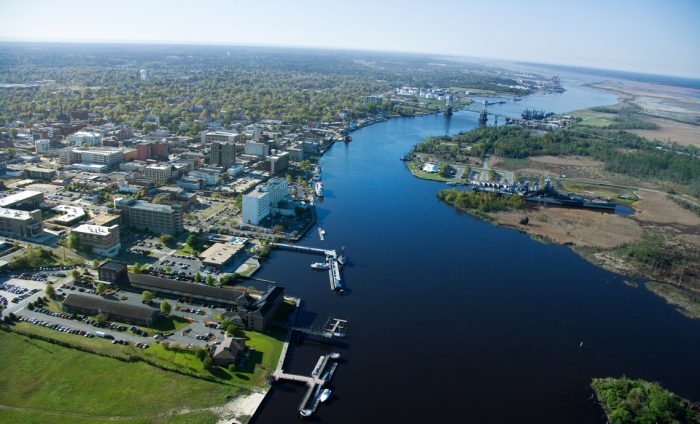Chemours permit misses chance to cut pollution
Update: This comment period was recently reopened. SELC has submitted comments to North Carolina Department of Environmental Quality and we encourage you to join us in urging the state to impose stronger limits on Chemours’ discharge of PFAS pollution into the Cape Fear River from a new groundwater treatment system. Below are steps to take action.
We will be closely watching the permitting process.
Under the draft permit, North Carolina officials plan to allow the Fayetteville-area factory operated by Chemours to dump high levels of toxic PFAS pollution—including GenX at 12 times higher than EPA’s recent health advisory—into the Cape Fear River from its new groundwater treatment system.
This decision threatens the drinking water for more than 300,000 North Carolinians in Wilmington, and New Hanover, Pender, and Brunswick Counties.
Take action to stop Chemours’ pollution
The North Carolina Department of Water Resources will continue to accept comments on the proposed National Pollutant Discharge Elimination System (NPDES) wastewater permit through 5 p.m., June 24. Comments submitted during the previous comment period from March 25 to May 2, 2022 are being considered and do not need to be resubmitted.
At a public meeting
IN PERSON
Date: Tuesday, June 21 at 6 p.m.
Location: Cape Fear Community College, Union Station, First Floor Auditorium, 411 N. Front Street, Wilmington
Register: Speaker registration opens at 5 p.m. via an onsite signup sheet
REMOTE/ONLINE
Date: Thursday, June 23 at 6 p.m.
Meeting Access: https://ncdenrits.webex.com/ncdenrits/onstage/g.php?MTID=e6a3cebefc6af2776f229c3d4f2c74da9
Event number: 2421 589 1484
Event password: NCDEQ
Register to Speak: Speaker registration by 12 noon, June 23, at https://forms.office.com/g/YEqDLDDDp7
Please contact Peter Johnston if you have issues registering online at 919-707-9011 or email [email protected].
Via email or mail
To submit comments by email, send to [email protected] with CHEMOURS noted in the subject line.
Public comments may also be mailed to:
Wastewater Permitting, Attn: Chemours Permit, 1617 Mail Service Center, Raleigh, N.C., 27699-1617.
SELC is keeping PFAS out of our rivers.
Finding ‘forever chemicals’ in the Cape Fear River
After the PFAS pollution was initially discovered, SELC’s litigation on behalf of Cape Fear River Watch led to a 2019 consent order to stop at least 99 percent of Chemours’ PFAS pollution that contaminated the Cape Fear River.
Since the consent order was signed, we’ve learned that treatment technology can remove more than 99 percent of PFAS. But instead of acknowledging that available technology can nearly eliminate Chemours’ pollution and then holding the company to that standard, the draft permit issued by North Carolina Department of Environmental Quality, or DEQ, would allow Chemours to release unnecessary PFAS pollution into the Cape Fear River for years.

“Solutions installed elsewhere at the site, as required by the consent order, have nearly eliminated Chemours’ PFAS pollution—DEQ must use that same information to protect communities from PFAS contamination in Chemours’ proposed discharge. The draft DEQ permit doesn’t provide that protection,” said Senior Attorney Geoff Gisler.
SELC is calling on DEQ to protect North Carolina communities by including limits on Chemours’ PFAS pollution that reflect what the treatment technology can do. Only then can DEQ prevent unnecessary PFAS from entering the Cape Fear and downstream drinking water supplies.
“After all we have learned over the past five years, it is shocking that DEQ would draft a permit allowing Chemours to release any PFAS into the Cape Fear River, let alone at the levels allowable under this draft permit. We need DEQ to do its job and protect us from Chemours’ historic and consistent disregard for human health and the environment,” said Dana Sargent, executive director of Cape Fear River Watch.
